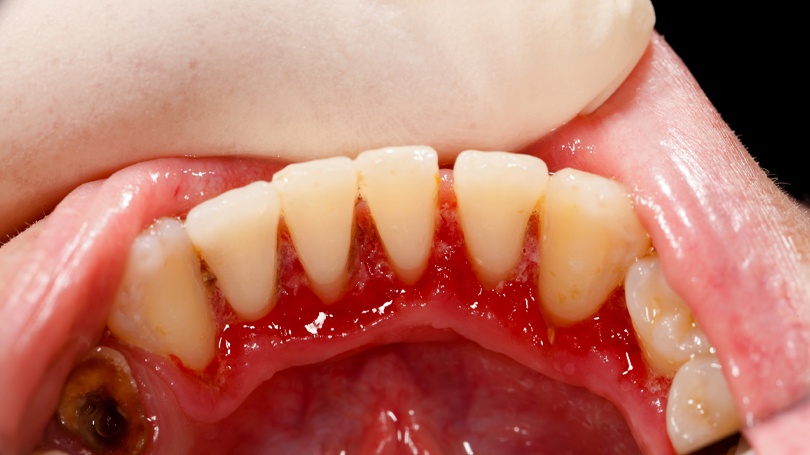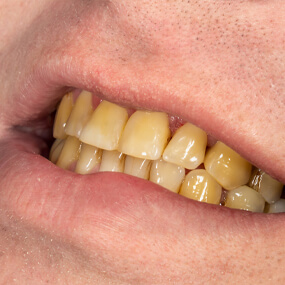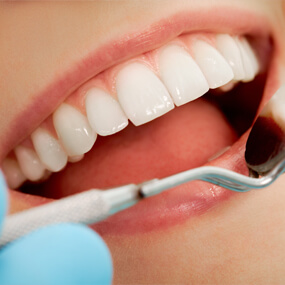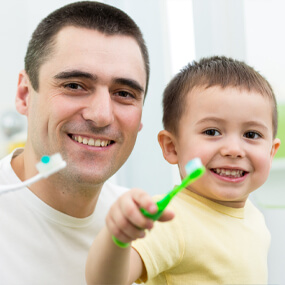Gum Disease: A Cancer Risk Factor

Gum disease has long been linked to a wide range of health problems, including diabetes, heart attacks, preterm births, and kidney disease. This connection is important to understand as the Centers for Disease Control and Prevention (CDC) warns that 50 percent of Americans age 30 and up have some form of the disease. Now, recent research has added cancer to that list of complications. This particular study found a 24-percent increase in lung and colorectal cancers in people with advanced gum disease—periodontitis—and saw the same increase among non-smokers.
This peer-reviewed paper was published in January 2018 in the Journal of the National Cancer Institute, and at the time of publication, it was the largest such study correlating gum disease to cancer risk. The study was a joint effort between three schools: Johns Hopkins Bloomberg School of Public Health, Tufts University School of Dental Medicine, and Tufts University School of Medicine. The research included dental records of nearly 7,500 people over a period of about 20 years. This data revealed that subjects with periodontitis were at a much greater risk of cancer than those with gingivitis or no gum disease.
This study is notable not only for the sheer scope but for measuring and classifying each case of gum disease rather than resorting to self-reporting, which is what most previous similar studies had done. Lung cancer was shown to have the strongest association with periodontal disease, followed by colorectal cancer. The data was adjusted for smokers, which greatly increases the risk of lung cancer, but even with those adjustments, the increase in risk was the same. In other words, people who had never smoked a day in their lives but had periodontitis were 24 percent more likely to get lung cancer than people with healthy gums. This could mean that gum disease is among the leading causes of lung and colorectal cancer in non-smokers. No link was found to blood, breast, and prostate cancer.
It is important to note a point emphasized by the researchers: developing periodontitis does not mean that you will eventually get cancer. Poor gum health is a risk factor, however, which means that it is essential to maintain good gum health throughout your life. Most of the people reflected in the CDC statistics have gingivitis, which is the earliest stage of gum disease.
Plaque accumulates on the teeth and between the teeth and gums. That plaque contains bacteria that infects the gums. Inflammation from the gums is a triggered response from your immune system. At this point, the gum disease is still reversible. However, if left untreated, the gum disease will progress to an advanced form: periodontitis. This advanced gum disease is only manageable, not curable, and it can lead to a host of dental problems, including tooth loss.
Signs of gum disease include receding gums, gums that are swollen and red, gums that bleed easily, loose teeth, and persistent bad breath as well as bad tastes in the mouth. You will likely have already developed gingivitis before these symptoms manifest, which is why it so important to see your dentist regularly. If you notice any of these indicators, schedule an appointment as soon as possible.
In order to decrease your risk of gum disease, you need to control the plaque that forms in your mouth. Brush twice a day with a soft-bristled brush. Use fluoride toothpaste. Clean your tongue with a scraper. Floss daily to remove plaque from between the teeth and from between the teeth and gums. During your biannual checkup, your dentist or dental hygienist will clean any plaque you missed. Be mindful that plaque forms within 24 hours and can harden into tartar within as little as 48 hours, and dental calculus is almost impossible to clean at home and has to be removed by a dentist or dental hygienist.
Safeguard Your Health
The benefit of good oral hygiene and regular dentist visits goes far beyond your teeth and gums. It can reduce your risk of cancer and many other serious diseases. Jeffrey D. Clark, DDS, and his team at Scottsdale Cosmetic Dentistry Excellence provide the preventative care you need: dental cleanings, fluoride treatments, comprehensive examinations of your teeth and gums, and more. Schedule your appointment with Dr. Clark today by calling us at 480 585 1853.




